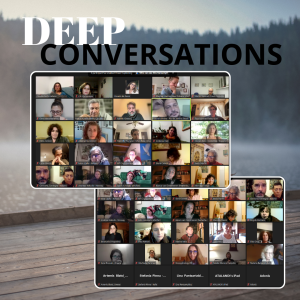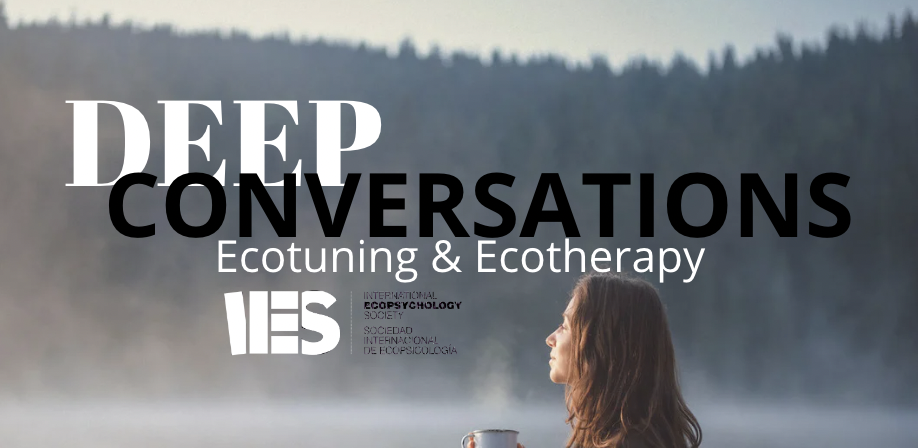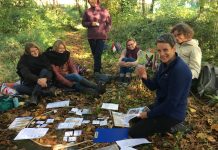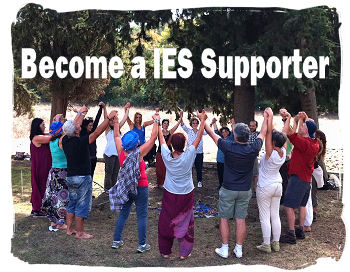“The Lakota knew that human hearts, away from nature, harden; They knew that lack of respect for living and growing things would soon lead to lack of respect for humans as well.” Luther Standing Bear, Oglala
With this great phrase, the first Deep Conversation of 2024 was concluded, facilitated by Dr Tina Asherae Fields, Charter IES USA and attended by 50 ecotuners from different countries, languages and cultures.
As Dr Fields commented, “IES offers a series of webinars where our Representatives present various ecopsychological topics. These Deep Conversations are a different type of offering, intended to involve all interested members in the discussion. “This is a place for sharing and dialogue that recognizes and harnesses the great gift of being a member of IES: its potential to create international connections and understanding about our shared field of interest.”
The topic of this first conversation was Ecotuning and Ecotherapy. Ecotuning, the ecotuner with nature, has as its main objective the reestablishment of the bond of love of the human being with the earth, and one of its main functions is to open safe spaces to be able to carry out ecotherapeutic processes that lead us towards the health of people and the ecosystems we inhabit.
With this opening, subgroups were formed by language (Spanish, English, Portuguese and Italian), accompanied by a facilitator who supported the conversation with questions and inspiration.
Let’s take a look at the valuable conclusions that came out of these subgroups:
1) How do you do things in the field of Ecotuning and Ecotherapy, whether for yourself or with others?
- Some of our group’s preferred methodologies and tools are Organic Art, dance, Theory U, the medicine wheel, contemplation, and self-observation.
- Walking in the mountains, in the sea, has always been a practice that my body and mind need and appreciate.
- I like to observe what moves around me (water on the surface of a lake, grass agitated by the wind, etc.) and let that movement look at me and pass through me. Sometimes the movement comes towards me, other times the movement starts from me and goes outwards, in a harmonious and beneficial exchange towards my interior.
- I am very interested in using my hands and those of the people who are with me, as a way to connect with nature. Touch as a sense that connects me with nature and at the same time becomes a way of doing/being together, collectively, of sharing and creating.
Getting in touch with the Genius Loci of a natural environment is a practice that allows me to initiate a “dialogue” with the creatures around me, an indispensable form of communication and relationship with nature, and with trees in particular. - Continuing with the theme of Genius Loci, contacting the spirit of the place is a powerful practice for me also when I facilitate the group because it makes me feel more rooted, welcomed and in some way also protected in the facilitation work with other people, as if there was an ally by my side.
- A practice that helps me a lot to connect with nature is to put myself on the same level, in size, as the animals, the stones, the blades of grass, the small creatures that surround me. This practice helps me see nature with different eyes, to capture new details, to have other perspectives.
- Connecting with my breathing and using the 5 senses to enter into dialogue with nature are the most significant practices as far as I am concerned to awaken self-awareness and at the same time bring all my attention to the other who is not me.
- For me it is very important and meaningful to celebrate the moments of changing seasons to notice the transformations that are taking place, the flow of becoming, the power of the cyclical.
- Taking care of the territory together with other people with small actions of recovery, cleaning, restoration builds a strong sense of community, of meaning, of belonging to the place.
2. What are the benefits and opportunities of Ecotuning and Ecotherapy?
- We are amazed by the healing power of nature in people’s lives, as a source of balance, personal regeneration and to heal the wound of separation of human beings and nature, which brings us so many breaks as individuals and as a society.
- To change the look,
- Learn to celebrate transitions, moments of change.
- Appreciate being in the transition.
- Value each person’s innate creativity.
- Leave space for understanding and expansion of consciousness.
- Learn to focus on the micro, on what is normally invisible to the eye.
3. What are some risks and drawbacks that may arise in the practice of Ecotherapy and Ecotuning?
- We must be attentive to the risks that these practices entail, since being in nature, immersed in the fabric of life, can lead us to come into contact with the deep fear of the primordial, an ancestral fear as humans separated from nature. nature.
- Hence, it is vital as Ecotuners and Ecotherapists to be prepared to manage emotions and crises, in the face of the different levels of self-regulation towards what landscapes generate in our psyche and the traumas with primordial beings such as the sea, the jungle, the mountain.
- It is important that people participating in the experiences do not take home the idea that you can only feel good “in the forest” (or in nature in general). It must be made clear that it is possible to “bring the forest home.”
- Time risk, that is, imposing schedules on the group that are not suitable for the proposed experience, or are not suitable for everyone.
- Take people’s reaction for granted. Deep contact with nature can give rise to unexpected emotions and thoughts. It is necessary to learn to face the unexpected.
4. Some ideas about possible future developments of Ecotuning and Ecotherapy.
- Propose to pre-existing groups, which cooperate with each other for other initiatives not related to experiences in nature, Ecotuning initiatives to improve the level of dialogue/cooperation/mutual knowledge within the relational dynamics of the group.
Propose initiatives to discover the territory, also in terms of conscious local tourism, with the perspective of Ecopsychology. - Evaluate possible applications in the school, business and social field.
- Go through any psycho-social intervention that we carry out with the love of nature.
- Do academic research and dissemination on the benefits of the link between human-nature for comprehensive health.
Thank you to all the participants for your valuable sharing, and for your green heart that constantly beats.

And special thanks to the contributions of the different working groups, for the writing of this summary:
Italian language group, facilitator Elena Cadelli
English language group, facilitators Tina Asherae Fields and Biaca van Overmeeren
Portuguese language group, facilitator Marco Aurélio Bilibio
Spanish language group, facilitator Marian Ríos
We are waiting for you in our next deep conversation on April 15, 2024, from 7:00 p.m. to 8:30 p.m. Rome, with the big topic: Ecopsychology in Organizations
Marian Ríos – IES President – Sept 2023 – Sept 2025













